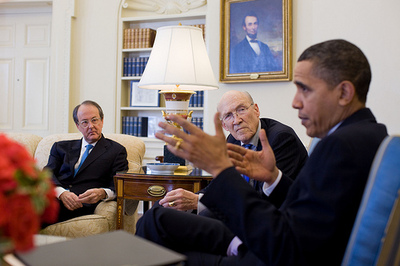 Throughout this year’s public debate over taxes and spending, many progressives have criticized the recommendations of President Obama’s fiscal commission as fiercely as they have attacked the more conservative proposals of House Republicans. Some on the left call it the “cat food commission,” suggesting that retirees would be forced to eat pet food if the commission’s proposals for changes to Social Security and Medicare were adopted. This vilification of the commission is probably one reason why President Obama has not fully embraced it, even though his deficit-reduction proposals this week drew heavily on its ideas.
Throughout this year’s public debate over taxes and spending, many progressives have criticized the recommendations of President Obama’s fiscal commission as fiercely as they have attacked the more conservative proposals of House Republicans. Some on the left call it the “cat food commission,” suggesting that retirees would be forced to eat pet food if the commission’s proposals for changes to Social Security and Medicare were adopted. This vilification of the commission is probably one reason why President Obama has not fully embraced it, even though his deficit-reduction proposals this week drew heavily on its ideas.
Progressive opposition to Bowles-Simpson is part of a long tradition of skepticism about the very idea of blue-ribbon commissions. Ironically, commissions first became widely used in American politics during the Progressive Era a century ago, when presidents like Teddy Roosevelt and Woodrow Wilson saw them as useful devices for figuring out how to regulate the economy and address social problems. But in modern politics the common response among progressives is the derisive snort. The conventional wisdom about commissions is quite cynical: They are little more than tools for elected officials to deflect political pressure, and they do not lead to reform.
But my research on over 50 blue-ribbon commissions that have examined national security issues reveals that commissions actually have a record of results. To give just a few examples, the reports of commissions hastened President Reagan’s decision to withdraw U.S. troops from Lebanon in 1983, spurred the creation of the Department of Homeland Security and the most important intelligence reform of recent decades, and provided the blueprint for then-presidential candidate Barack Obama’s plan for winding down the Iraq war.
Contrary to the prevailing view, blue-ribbon commissions are a valuable tool for forging the kind of bipartisan agreements necessary to preserve and improve cherished government programs, while addressing serious problems like our out-of-control debt. The changes proposed by commissions will rarely leave progressives fully satisfied, but they typically represent the best available deal and advance important progressive goals. For instance, if the Bowles-Simpson commission proposals were enacted into law, military spending would be cut sharply, new money would be devoted to research and development and boosting college graduation rates, taxes would be raised with the greatest new burden falling on the wealthy, and the Social Security tax and benefit formulas would become more progressive. These would be major achievements, and they can be accomplished only with the help of a bipartisan plan that also includes elements, such as overall spending cuts, that appeal to some Republicans.
Commissions can have this large impact because of their distinct political credibility, which stems from their independence from the permanent institutions of government, the stature of their members, and—in particular—their bipartisanship. Commissions are almost always politically diverse, yet their members, unlike most elected Republicans and Democrats, often manage to reach agreement by engaging in real deliberation and finding common ground, rather than scoring political points. (Two-thirds of the commissions I researched issued unanimous final reports.) The resulting compromises are rarely fully satisfactory to any one group, but they frequently represent the most politically realistic set of solutions, and their credibility on both sides of the aisle often makes them the focal point for legislative efforts.
Progressives do not have—and are unlikely to have in the foreseeable future—enough votes in Congress to pass legislation simply by sticking to our guns. We need support from centrist Democrats and Republicans to achieve any progressive legislative goals, and commissions can be allies, rather than enemies, in this effort.
In his speech last week, Obama, like a majority on the Bowles-Simpson commission, called for a combination of spending cuts and tax increases to shrink the debt over the next decade—an acknowledgement of our fiscal reality. In times of divided government, like now, it is difficult to enact presidential priorities, and compromise with members of the opposing party is essential to get anything done.
This is why blue-ribbon commissions can be so valuable. Progressives should see commissions as tools for effective governance, especially in a time when many conservatives seem intent on not governing at all. We still need to govern, and any institutions that reinforce the idea of responsible, sober governance need our support. Commissions cannot reverse the dismal trends of government bashing and severe ideological polarization, but they can help mitigate them—and move our country forward by facilitating bipartisan agreement on pressing challenges.
Click to
View Comments